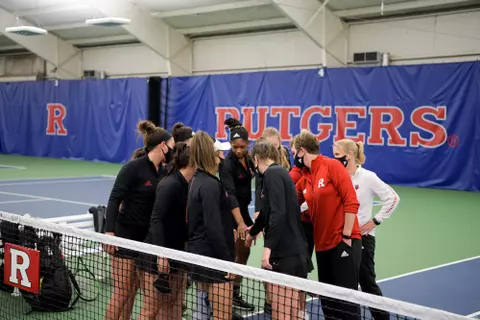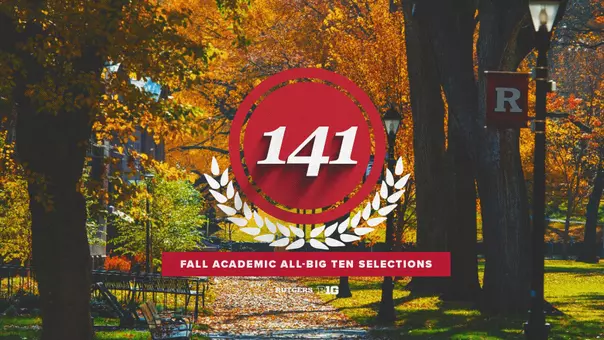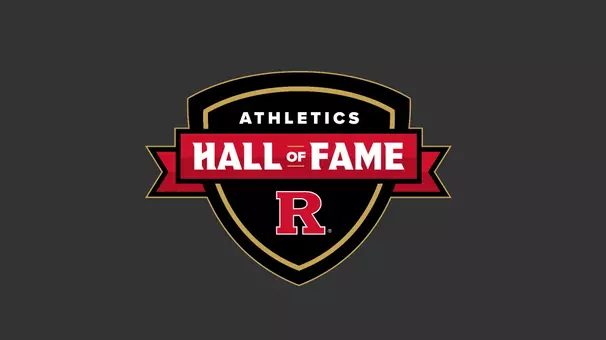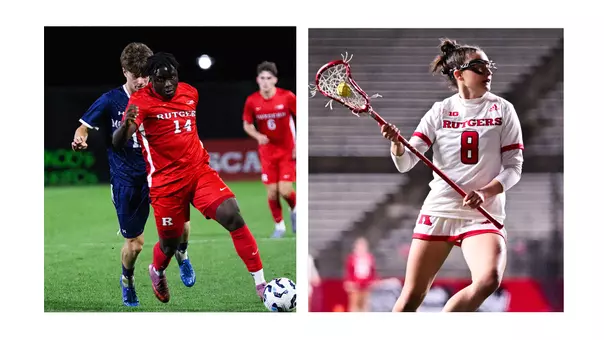
Training Student-Athletes For Life
The Rutgers Behavioral Health and Sports Psychology team works to destigmatize the conversation around mental health and equip the Scarlet Knights with tools for success
Hasim Phillips
5/2/2022
As the saying goes, proper preparation prevents poor performance. This is applicable in all aspects – mental, physical and emotional – of being a successful student-athlete. At Rutgers, there are teams of providers who are charged with ensuring the Scarlet Knights are of sound body, mind, and spirit.
For Peter Economou, Ph.D. and his team of clinicians, providing Rutgers student-athletes with the tools to tackle mental challenges is as critical to their success as the physical support required to compete in the Big Ten Conference. To truly provide the holistic support that Rutgers Athletics is committed to offering every student-athlete, placing an emphasis on training the mind is imperative.
“We focus on strength-based, multiculturally competent and evidence-based approaches,” said Economou. “Those are the three things that we would consider as what we're offering. Everything that we're doing is guided by science and by research.”
“Our sport at the collegiate level is 80% mental and 20% physical. Being able to establish a strong mental performance will enhance their physical performance."Umme Salim-Beasley, gymnatics head coach
There is a social focus to how Economou and his staff engage with each student-athlete. It is important that the individuals are viewed as more than being an athlete. The work that they do is measurable and follows a uniquely tailored plan to assist the students in maximizing their potential.
“Helping them find their way is really what drives my passion,” said Economou. “This work is such a cool opportunity to be able to help someone get in touch with their identity.”
Dr. Pete, as he is known within the Rutgers athletic department, approaches the clinical work from a Cognitive Behavioral Therapy (CBT) orientation, mostly emphasizing mindfulness-based strategies. His training and experience have led him to the belief that many of our concerns are rooted in learned experiences, suffering is universal and everyone suffers, and we can train our minds to function at the optimal envisioned level.
“Our sport at the collegiate level is 80% mental and 20% physical,” said head gymnastics coach Umme Salim-Beasley. “Being able to establish a strong mental performance will enhance their physical performance. In working with Dr. Pete and his team, we were able to allow our athletes to see how beneficial behavioral help is in aiding their approach to performance. We saw improvements in their level of focus, confidence, and overall well-being. We were pleased to see that regular behavioral help increased our team's consistency in competition.”
The primary purpose of the Rutgers Behavioral Health and Sport Psychology team is to treat, educate, and support student-athletes to effectively manage the challenges of being a Division I athlete. The impact the staff has had is one that reaches beyond what the student-athletes are able to achieve in competition.
“To me, the most significant benefit of mental fitness training comes in how I approach things in my everyday life,” remarked one student-athlete, who will not be identified to protect their privacy. “I have learned to let go of minor inconveniences that I know are temporary. I’ve become more mindful of how I react to things which allows me to dig into the “why” of my responses. As a byproduct, I’ve experienced more thoughtful decision making as well as decreased stress in my life.”

The lifecycle for each student-athlete draws similarities in that most will begin and end their collegiate athletic careers during the span of 18 to 24 years of age which are their most formative years. Economou and his team are able to identify the different needs of each individual and determine how to best support them. The pressure that comes with competing on the Division I level cannot be understated, however, couple those challenges with navigating the world as an adolescent and it is easy to recognize how vital a strong mental support system is for the Scarlet Knights.
“There's so much happening biologically, psychologically, spiritually and emotionally,” said Economou. “Being able to help people through that is really cool, but not everyone will need it because suffering presents itself on a spectrum. We certainly have people who present with some serious challenges and severe pathology, and then we have others who are really trying to understand their identity and become a better version of themselves.”
Under the direction of Chief Medical Officer Joshua Bershad, M.D., the Behavioral Health team is part of a group that serves the Scarlet Knights in four domains that includes sports medicine, nutrition and athletic training in addition to behavioral health. A landmark partnership with RWJBarnabas Health and state-of-the-art facilities provides a training ground for not only the Scarlet Knights, but also the practitioners charged with keeping them ready for success in and out of competition.
It is one of the reasons Economou recruits a staff of varying levels of expertise to create a developmental framework among the practicing caregivers. The team consists of master’s and doctoral students, post-doctorates, pre-licensure and licensed specialists.
“If we think about this whole sport health system, which includes these four main domains of sports medicine, behavioral health, nutrition and athletic training, it is a training model,” said Economou. “The nice thing with our partnership with RWJBarnabas Health and the medical school is that we recognize that training is a big piece of what we do.”
When identifying individuals to join his staff, Economou focuses on the intangibles. Among the many traits he focuses on is whether that individual is a good person. As someone who will be asked to guide and support young student-athletes, that aspect of a person’s qualifications can matter more in many ways.
“Something I always think about is I never bring someone onto a team or hire someone who I wouldn't refer a family member to,” said Economou. “That is one of the gauges that I use. I probably focus less on clinical skill and more on who they are as a person because skills can be learned. Ensuring that you have good people who have big hearts, are ethical and have morals is most important. Anything else thereafter can be shaped.”
Economou relies on his experience and role with the Rutgers University faculty to aid in that holistic support of student-athletes. In conjunction with the academic advising staff, the behavioral health team helps address the challenges that a strenuous academic workload can place on a student-athlete. The pressure to maintain a high academic bar can manifest in many ways, often impacting the focus needed to practice and compete at a high level.
“I’ve learned to reduce the amount of pressure I put on myself in the classroom,” the student-athlete added. “In the past, I would have a hard time not having everything done perfectly and well in advance of the due date. Mental fitness training has helped me put these immense expectations and standards aside without a drop off in my performance (GPA was higher this semester than in the past). I was able to achieve this while experiencing less stress around class work.”






The benefits to the collaborative approach on the Rutgers campus has also been witnessed across the Big Ten Conference with all 14 institutions joining a taskforce to promote mental health awareness. Since its inception, the Big Ten cohort has announced several initiatives to promote positive mental health among student-athletes, coaches, athletic administrators, and staff.
“It’s highly beneficial,” said Economou. “We’ve been able to share resources across the Big Ten Conference related to coaches, athletes and administrators so it’s not just one group we’re looking at. It’s nice to have that [Big Ten] support and we fully have that support at Rutgers as well. Any growth initiative that we have brought related to behavioral health and wellness has been supported.”
The taboo around mental health continues to shrink and the acknowledgment that everyone deals with some level of mental stress has become more widely accepted. It’s not just about individual care for the Rutgers Behavioral Health and Sports Psychology staff. There is an interconnectedness that exists within an athletic department and to address the impact mental health can have, resources are offered to coaches, athletic administrators, and staff. There are team-based workshops and department-wide initiatives like Wellness Wednesdays which offer opportunities to learn how to better manage the ebbs and flows of life.
“That's a lot of the work that we do,” said Economou. “Destigmatizing what it means to suffer and understanding everyone suffers, and then providing resources. The healthier our coaches and administrators are, the better experience for our student-athletes and the same for student-athletes. The group dynamic can be approved upon once people can accept that there are challenges that would present themselves no matter what within any group.”
Salim-Beasley has witnessed how a focus on mental health and an openness to addressing those issues among her student-athletes has translated to success in the gym.
“By having daily mental health and sport psychology sessions, we were able to break down the negative stigma that so many athletes have in regards to mental health support,” said Salim-Beasley. “We were able to normalize and prioritize behavioral health as another piece in our daily routine. Our team now trusts the advice that they are given and are willing to apply it in their practice and competitions. These strategies have helped us to break longstanding program records.”





